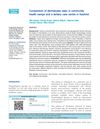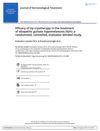 31 citations,
May 2021 in “Journal of endocrinological investigation”
31 citations,
May 2021 in “Journal of endocrinological investigation” APS-1 in Italy shows diverse AIRE mutations and various autoimmune issues.
 2 citations,
September 2020 in “International journal of radiology & radiation therapy”
2 citations,
September 2020 in “International journal of radiology & radiation therapy” Radiotherapy can cause rare changes in hair color, which should be discussed with patients.

The study concluded that Frontal fibrosing alopecia can affect younger people, is often missed in men, and may be autoimmune-related.
 9 citations,
June 2019 in “Archives of Dermatological Research”
9 citations,
June 2019 in “Archives of Dermatological Research” Both topical calcipotriol and narrowband UVB improved alopecia, but combining them didn't enhance the effect on hair loss severity, despite higher vitamin D3 levels.
 October 2007 in “Journal of Investigative Dermatology”
October 2007 in “Journal of Investigative Dermatology” The document suggests a bacteria plays a significant role in acne rosacea and that white hair can regain color after transplant, meriting more research on reversing grey hair.
 70 citations,
May 2014 in “JAMA Dermatology”
70 citations,
May 2014 in “JAMA Dermatology” The representation of skin conditions in medical reviews partly matches their real-world impact.
 January 2019 in “Elsevier eBooks”
January 2019 in “Elsevier eBooks” Different hair disorders have specific treatments and outcomes, with some resolving on their own and others requiring medication or emotional support.
 December 2024 in “Microorganisms”
December 2024 in “Microorganisms” Microbiota changes in deer antler velvet aid in wound healing and tissue regeneration.
 34 citations,
April 2008 in “Journal of the European Academy of Dermatology and Venereology”
34 citations,
April 2008 in “Journal of the European Academy of Dermatology and Venereology” Skin problems like itching, dry skin, and hair loss are more common in hepatitis C patients after interferon treatment, but lichen planus is not linked to the infection.
 3 citations,
April 2019 in “The journal of investigative dermatology/Journal of investigative dermatology”
3 citations,
April 2019 in “The journal of investigative dermatology/Journal of investigative dermatology” ILC1 cells contribute to hair loss in alopecia areata.
 January 2019 in “Przegląd Dermatologiczny”
January 2019 in “Przegląd Dermatologiczny” Patients with one autoimmune disease should be checked for other autoimmune disorders.
 25 citations,
December 2017 in “Facial Plastic Surgery”
25 citations,
December 2017 in “Facial Plastic Surgery” Combination therapy with steroids and pimecrolimus improved or stabilized hair loss in most patients with Frontal Fibrosing Alopecia, who also had a high rate of hypothyroidism.
 46 citations,
August 2019 in “Journal of Ethnopharmacology”
46 citations,
August 2019 in “Journal of Ethnopharmacology” Eclipta prostrata has many traditional uses and health benefits, but more research is needed to understand how it works and ensure it's safe.
 4 citations,
April 2023 in “Autoimmunity reviews”
4 citations,
April 2023 in “Autoimmunity reviews” High levels of IL6 and CRP, and low levels of vitamin D, might be indicators of alopecia areata.
 128 citations,
February 2016 in “British Journal of Dermatology”
128 citations,
February 2016 in “British Journal of Dermatology” Alopecia areata significantly lowers the quality of life, especially in emotional and mental health aspects.
 5 citations,
January 2014 in “Indian Journal of Dermatology, Venereology and Leprology”
5 citations,
January 2014 in “Indian Journal of Dermatology, Venereology and Leprology” Non-infectious skin conditions are more common than infectious ones in Kashmir, but community areas see more infections, suggesting a need for better skin care services in primary health care.
 December 2023 in “EPRA international journal of multidisciplinary research”
December 2023 in “EPRA international journal of multidisciplinary research” Alopecia areata causes sudden hair loss, has genetic links, and can be managed but not cured.
 7 citations,
December 2018 in “Journal of Cosmetic Dermatology”
7 citations,
December 2018 in “Journal of Cosmetic Dermatology” Eating vegetarian, having allergies, and family history might be linked to getting gray hair early.
 9 citations,
August 2018 in “Journal der Deutschen Dermatologischen Gesellschaft”
9 citations,
August 2018 in “Journal der Deutschen Dermatologischen Gesellschaft” Most patients with frontal fibrosing alopecia are middle-aged women, often have thyroid disease, and some treatments can help stabilize the condition.
 2 citations,
February 2009 in “Journal of the American Academy of Dermatology”
2 citations,
February 2009 in “Journal of the American Academy of Dermatology” Many research paper titles in dermatology journals lack scientific precision.
 8 citations,
January 2003 in “Pharmacotherapy: The Journal of Human Pharmacology and Drug Therapy”
8 citations,
January 2003 in “Pharmacotherapy: The Journal of Human Pharmacology and Drug Therapy” Chemotherapy may cause recurring hair loss due to an autoimmune response.
 June 2023 in “Journal of cosmetic dermatology”
June 2023 in “Journal of cosmetic dermatology” Both DPCP alone and with PRP are effective and safe for treating severe alopecia areata.
 6 citations,
March 2020 in “Jornal de Pediatria”
6 citations,
March 2020 in “Jornal de Pediatria” Inflammatory skin conditions are the most common in Brazilian children, with atopic dermatitis being the top issue.
 12 citations,
February 2023 in “Journal of Personalized Medicine”
12 citations,
February 2023 in “Journal of Personalized Medicine” Type 1 diabetes often occurs with other autoimmune diseases, and personalized treatment based on genetics can improve outcomes.
 February 2022 in “Global academic journal of medical sciences”
February 2022 in “Global academic journal of medical sciences” People with alopecia areata have much lower Vitamin-D levels than healthy individuals.
 11 citations,
August 2016 in “Journal of dermatological treatment”
11 citations,
August 2016 in “Journal of dermatological treatment” Tip cryotherapy effectively treats idiopathic guttate hypomelanosis with minimal side effects.
 1 citations,
July 2016 in “British Journal of Dermatology”
1 citations,
July 2016 in “British Journal of Dermatology” Men with a certain type of hair loss often use facial moisturizers, and a specific antibiotic treatment may help another hair condition.
 13 citations,
November 2021 in “Frontiers in Immunology”
13 citations,
November 2021 in “Frontiers in Immunology” Melatonin could be an effective treatment for Alzheimer's Disease and rosacea.
 4 citations,
January 2022 in “Drug design, development and therapy”
4 citations,
January 2022 in “Drug design, development and therapy” Intramuscular corticosteroids are effective and safe for severe alopecia areata, with most patients regrowing hair, but nearly half may relapse.
 1 citations,
May 2023 in “Journal of neuroendocrinology”
1 citations,
May 2023 in “Journal of neuroendocrinology” DAVID syndrome is a condition with immune system and hormone deficiencies, needing early diagnosis to avoid serious complications.






























